- Home
- BobA. Troutt
When Autumn Falls Page 2
When Autumn Falls Read online
Page 2
When Autumn Falls
Portland 16 Miles
It was a beautiful June day in 1947 as I drove along the highway into Portland, Tennessee. I am Clint Forrester, a reporter for the Nashville newspaper, Tennessee Times. The paper had asked me to do a feature story on the Strawberry Festival in Portland. Every year, Portland, known as the Strawberry Capital of the World, holds a big festival celebrating its harvest and workers. It is a big event for people in northern middle Tennessee. Any given family on any given day driving into Sumner County would see a sign that read “Portland 16 miles”. But this week is special; everyone is headed for this year’s Strawberry Festival.
As I entered the city limits, I noticed some buildings on the south side of the road, a train depot, several stores, markets, and shops. I couldn’t help but notice a large berry field and pickers working. The fields were bright with red berries on both sides of the road. The pickers were scattered about in the field, working two rows at a time. Other pickers brought in the harvest in quart containers, filling the crates up to get ready for the markets.
In mid town there was a park, where a carnival had been set up. There were rides including a Ferris wheel, merry-go-round, flying swings, rides that flip, twist and turn about, and a lot of kiddie rides. There were many games of chance; you could win teddy bears for your sweethearts, what-cha-ma-call-its, balloons, and thing-a-ma-jigs. There was a hoochie coochie show, fortune teller, and live camel rides; everywhere you looked there were posters announcing the strawberry dance and talent show. I have to say Uncle Bob’s Carnival World out of Alabama has one of the greatest shows around. They had a little bit of everything—even strawberry fizzes with a touch of scotch.
I had just arrived in town, and had a few minutes to spare before I went out into the fields to interview the workers. Suddenly, I saw a sign that read “Jessie and Harve’s Barber Shop.” As I parked, I noticed a barber pole slowly turning with a touch of a squeak. The windows in the shop were open, and as I stepped through the doorway I felt a slight breeze. I saw four or five men sitting around the wall. Two men were playing checkers; one man was whittling a piece of wood, dropping his shavings in a wooden box with his tobacco juice. At first they didn’t say anything, but when I introduced myself things opened up. There was a young man sitting in one of the chairs getting a cut. I recall the barber called him Herbert. The two barbers spoke up and welcomed me in.
One said, “My name is Jessie and this is my brother Harve.”
“What can I do for you?” spoke up Harve.
“I could use a light trim,” I said.
As I sat down in the chair, he quickly whipped an apron around me, snuggled it in around my collar, and pumped up the chair a lift or two.
“You are not from around here,” said Harve as he blew into the teeth of the clippers.
“No, I’m not,” I replied as I heard the clippers come on.
I explained my visit and I encouraged everyone to feel welcome to pitch in any information that I could use in my article. Then they opened up like magpies. Everyone started talking at once. One man even stood up and did a little soft shoe for us. He had danced once in a dance contest, but he laughed and slowly sat back down and said he was too old now. The man beside him called him by name.
“Winfred, I believe you’re too old now,” he laughed. “You can’t even cut the mustard anymore much less a little soft shoe.”
Then he shuffled his feet a bit too and laughed. Then Jessie turned and asked me, “That article you are writing…will it have any pictures?”
“A few,” I replied.
“What about a picture of Harve and me and the barber shop?” he said. “Business gets a little slow around here at times. We could use the publicity.”
Then he laughed. The boy in the chair looked around and grinned.
“What about it Herbert, do you want in the picture, too?”
The boy slipped out of the chair saying no to his picture in the paper.
“How much, Jessie?” he asked.
“A quarter will be fine, Herbert. Didn’t you want me to do anything to the cowlick?” asked Jessie.
“No, it’s fine,” he replied.
Slowly he reached down into his overall pocket and pulled out a quarter.
“I’ll see you,” he said. “Thank you. I have to go.”
“What’s wrong with Herbert?” asked one of the men. “He acted like he was a little spooked.”
“Oh, Herbert is probably alright,” stated Harve. “He’s a little strange at times. Someone said he was a little slow, kinda touched.”
Herbert was a tall lanky boy who wore wire-rimmed glasses. His pants were cut between his knees and his ankles; his belt looked like it went around him twice while his shirt flopped loose as he walked. He had straight brown hair that stuck out from under his tam hat.
“Is he from around here?” I asked. “Does he have any family here?”
“No, sir, not really,” Jessie replied. “I guess we can say we are his family.”
“Someone said,” Winfred interjected, “that Herbert was from up in Kentucky somewhere near Ohio. What was the name of that place? Carlton or Kerry? No it was Carrollton, Kentucky. They said it was about forty-two miles from Cincinnati, Ohio where the Ohio River and the Kentucky River meet.”
“Well,” interrupted Jessie, “he’s a good boy and well thought of around here, regardless if he is a little slow or where he is from.”
Then I heard Harve quickly wiping the razor up and down the strap, putting a smooth clean edge on the razor. As he led the razor from side to side, he eased back the chair and brushed on the soap with a small round brush. As he lathered up my face for a shave, the last thing I remembered was the sparkles I saw at the razor’s edge. Next, I swallowed.
“Lie still,” he said.
Within minutes it seemed like I was upright in the chair and Harve was removing the apron. With a dash of powder about the back of my neck and a splash of barber shop cologne about my face, I was done. I asked him how much.
He said, “No charge. You are doing a story on the strawberry festival, that’s pay for us all.”
I turned and thanked him and stepped out to my car to get my camera. I went back in, snapped a few shots and thanked them again.
As we waved and said our goodbyes, Winfred spoke up and said, “Don’t you want to take a shot of my smooth steps?”
I replied, “I wouldn’t leave Portland without it.”
Everyone laughed and waved as I drove off. After I left the barber shop, I headed to the field outside of town to interview some of the workers.
I was told many of the pickers were from neighboring towns. They would bring them in on the back of pickup trucks and school buses. The migrant workers rode in on the train. There were only a few migrant families that traveled the harvest circuit.
As I pulled up beside the road, I grabbed my camera for some quick shots. It was a beautiful, sunny day with a breeze blowing close to the ground. I know those pickers felt blessed to enjoy it. They call it cotton britches winter, the last of the spring winter. Cotton britches winter usually fell around the first of June.
There had been plenty of rain last spring. It would be good for the berries if it didn’t rain too much. This year the berries were blushing a deep red. They were sweet with dark green caps.
“It looks like a good harvest,” said one worker.
I stood back out of their way as some of the workers brought in their berries. I watched the woman who worked in the crate house. She took the pints of berries the workers had picked and fixed them to be crated up. Two pints made a quart, four quarts made a gallon and sixteen quarts—eight quarts a layer and two layers—make a crate of berries, at ten cents a quart. Each person was tallied up and their time and money was kept on a card. On the following Friday they would turn in their card to get paid. Some growers requested pickers to cap the berries, which was slower. I couldn’t help but n
otice some workers started on the same end of the rows while others started on both. I asked the woman in the crate house about it, and she told me on the long rows, two workers start on opposite ends and meet in the middle. She also told me that the grower would take the workers to the carnival on Saturday night so they could have some fun.
After several interviews, I started making my way to the car when I saw Herbert taking a break. I thought I would say hello since we didn’t get to talk much at the barber shop. I sat down beside him. He was eating a biscuit with butter and syrup. He told me he’d been picking since he was fourteen. Then he started on another biscuit, but this time he had dressed it with mustard. He told me mustard and cold biscuits were his favorite. Then I asked him if he was looking forward to the carnival. That was when I noticed his hands shaking. Before he answered, he must have caught me staring. He stood up and said he had to get back to the field.
“I’ll see you,” I called. “Thanks for the talk.”
Quickly, he tore off to the end of a row and started picking.
I spent the rest of the day window shopping, talking to people, and enjoying the festival. After a few hours I made it back to my room at the Russell Hotel. The hotel was not far from Midtown Park. From the open window, I could hear the music of the rides, people laughing, and the sound of the train pulling into the depot. I lay down on the bed to relax and fell right off to sleep.
When I awoke three hours later, I heard a man yelling, “Popcorn, come and get your hot popcorn.” Night had fallen and through the window I felt the warmth of the night along with the sounds of the carnival. After a quick bath, I rushed out the door eager to join the fun outside. I really didn’t know where to start. The carnival seemed so big at night, and the park was filled with people. As I began to move about thinking maybe I might pick up some more ideas on my article. Then the craziest idea ever hit me. I wanted to ride the camel. It was different than I thought. I fell off. The trainer picked me up off the ground and made sure I was alright. I was a little jarred and covered in straw, but I was okay. I quickly disappeared into the crowd, hoping no one would recognize me as the man who fell off the camel. I made my way across to the food and agriculture barn. When I arrived the judges had selected the winners of the baking contest. First place was a cream cheese strawberry pie from a woman in Franklin, Kentucky. Then my eye caught the catch of them all. A nearby booth was selling dog dumplings. I had never heard of them, and asked the vendor what they were.
He explained, “We take a ham bone and boil it. Then we make our dumplings out of meal and some other things that’s a secret. Next, we spoon up the meal mix into a ball and then drop it into the boiling water. You want to try one?” he asked.
“Sure,” I replied. “They look good.”
He fished me one out and placed it on a plate. I took a bite, and it was nothing like I had ever eaten. It was delicious. Then he asked me if I wanted a bowl of white beans and roasted corn.
“You bet,” I replied.
“Do you want hoe cakes or hot water cornbread?”
“The cornbread,” I replied.
I walked over to a table and sat down to eat. When I got up, I could hardly hold another bite. What would tomorrow night be like? After my food settled down, I did manage to work in a few rides before I called it a night. A cake walk, a dance, a talent show, and hay ride were ahead to look forward too.
Morning came early, and I rushed over to the courthouse to do research work on the past history of the Strawberry Festival. There were only two more days of the festival and I had already gotten enough information and pictures to write a book. As I was reading some of the old Portland papers, I came across a story not directly linked to the strawberry festival. A Portland man, Gilbert or Albert Griffin I couldn’t make it out, was being sought for questioning in a murder case in Louisville, Kentucky. The Portland native was last seen with the victim, Willie B. Long, outside the Blue Diamond Bar in Louisville. That was all the article really said. I then decided to turn in. It had been a long day.
The next day, I went out to the fields again. Most of them had been picked. There was nothing left but little green nubs left on the vines. I decided I would like to spend some time with the migrant families and get their side. Manuel told me they had enjoyed it and they as a family had done pretty good. He added that some years you do better than others. This had been a good one. When I asked him where they were from, he told me Laredo, Texas. I asked if he was homesick. He nodded his head and went back to work.
The day passed and night eased in. The night sky was starry. It had been another beautiful day. I would have to say the Lord had been good to us. Everyone was gathering in Midtown Park for another rendezvous with the fun and excitement. That night I made my rounds, talking to people and joining in the fun. I did the cake walk and won twice, a coconut cake and a chocolate pie. The egg toss was fun along with the sack race. But I stayed away from the greased pig, instead trying my luck with the tug-of-war.
As I walked by the hoochie coochie show, the girls winked, but I acted like I didn’t see them. Walking on, I came upon a fortune teller named Rosey and her friend Bebe who wanted to read my palm. I figured, why not, so paying her I sat down at the table and held out my hand. She took it and gently moved her finger up and down the creases in my palm. She had dark hair and skin and her hands and knuckles were covered with jewelry. She had on a long flowing dress and had an appealing accent. Her assistant was short with shoulder length hair and a mole beside her nose.
The fortune teller stopped and started telling me things of my past. A lot of them were true. I was amazed. Then she quickly closed my hand, holding my hand tightly in hers she said, “The land seems barren and lies at rest from the harvest. It seems to cry out for the rape of its fruit. The wind hovers low above the ground. While tonight the land lies await with its victim and then it returns to its rest. For the berries are blood red.” I passed it off as mumbo jumbo and got up and moved away. Then she cried out, “The night cries out, vengeance!” I laughed and walked on.
Early the next morning I went back over to the courthouse. I needed to do a little more work on my feature. After spending several hours going through boxes of papers, documents, and old newspaper articles, I ran across some more updated information on the Portland man and the Louisville murder case. Evidently, they picked up Gilbert Griffin, the Portland native. After the interrogation by the Louisville police, they released him of all charges and arrested Maynard Falls with the murder. I didn’t think anymore about it after that.
Tomorrow I thought I would be headed back to Nashville. I had kept in touch with the office the best I could. Some of the telephone lines are six-party and it makes it hard to get through.
As the day soon passed, I heard a lot of noise outside my window as Uncle Bob’s Carnival World was tearing down and packing up the rides and booths. They were heading out to their next stop, wherever that may be.
Later on this evening they would be having a hayride, along with this year’s crowning of the strawberry queen, awards, and end with the festival dance. Everyone was still as excited as they were on the first day. No one seemed to be thinking that in a few hours it would all be over.
That afternoon when the Massey-Ferguson tractor pulled up with a load of hay, they jumped on the wagon and headed down Main Street. “What it would be to be young again,” I thought. By now, the carnival had left Midtown Park and a stroll would have been nice, until it started to rain. Quickly I took off for the agriculture hall where they were having the dance. The closer I got to it, the faster and harder the rain fell. Then all of a sudden I heard screaming and hollering. I quickly turned around as the hayride pulled in. They were soaked and covered with straw from head to toe. I had to get a picture. You should have seen them. The night was still young, wet but young.
As the evening went on, Elizabeth Russell was crowned this year’s quee
n. I took a picture of her. She was a pretty girl. Then after the crowning, the local band got ready to kick the dance off. Everyone was anxious to get out on the dance floor. Even though it was still raining, they weren’t going to let anything water down their fun.
Suddenly, the band leader yelled out, “1, 2, 3!”
Then they hit the dance floor, except me and a very few others. They were jumping and hollering to the beat of the music. As I slowly looked about the room, I suddenly saw Herbert sitting over by the door. I sat down and asked him how he was liking the dance.
He replied, “It’s okay.”
I asked him was he going to dance.
He said, “No.”
I replied, “A good looking man with those long legs is not going to dance?”
“No,” he replied. “I don’t dance.”
I laughed and said, “Me neither.”
We sat a while and made small talk. I couldn’t help but to notice him looking out the door, but I never said anything to him about it. I guess he was waiting for the rain to slack up. In a few minutes, he pulled out his pocket watch and checked the time. At the snap of the closing of his watch, he stood up and said he had to go home.
I offered to take him but he insisted to go alone. He said he knew a short way. I watched him disappear into the rainy background of the night, then I turned back to the dance floor. This band was really good. I couldn’t hold my feet still. They wanted to dance but my butt held fast to the chair. Then about forty-five minutes later Herbert bust through the door.
“A dead woman, a dead woman!” he screamed.
Then Carson Wilson, the police chief of Portland, ran over to him.
“What is it Herbert. Where’s she at?”
As Herbert fought to get his breath, he finally slowed down enough to talk.
“Now, Herbert,” he said, “tell me what you saw.”
“Chief Wilson, I was on my way home. I took the short cut I always take through Witcher’s Field when I stumbled on a dead woman laying face down on the ground.”
“Okay, son, can you take me to the body?” he asked.
“Yes, sir,” he replied.
Then Chief Wilson spoke up to the crowd, “I need a few men with flashlights to go with me. The rest of you stay here.”
I quickly jumped in to follow him. You could see the fear in the people’s faces. Nothing like that had happened in Portland before.
“Only in the big city,” one cried.
“There’s a murderer out there,” cried another.
Then Chief Wilson stood up on the stage and whistled out loud. “Folks, the festival is over. Go home. There’s no need for panic. You will be safe at home. It’s probably someone passing through or an isolated case. Go home, please, and lock your doors.”
Herbert rode with Chief Wilson. Some jumped in their cars and drove to the field.
Others took off on foot and ran. I followed with the others not far behind. It was pitch black, not a star in the sky. The rain was falling hard on the cars, sounding almost like hail. The lightning streaked across the sky, haunting the night. When we arrived we pulled off on the side of the field and got out.
“Herbert, do you think you can find the body again?” asked the chief.
“Yes, sir,” replied Herbert trembling all over. “I think I can.”
“Good boy,” encouraged the chief. “Let’s go.”
As we stumbled our way down the patch, the mud from the field almost pulled your shoes off your feet when you stepped. The light of the lightning helped us to see somewhat. Then all of a sudden, boom, and the cry of the thunder sounded as lightning struck nearby. We all jumped and the hair on the back of my head seemed to stand on end. Boom, the thunder sounded again as a streak of lightning lit up the field.
“Over here,” cried Herbert. “Over here, Chief Wilson.”
Quickly, we made our way to him and there, lying at his feet, was a body. As everyone shined their flashlight on the body, the chief looked it over. Then Chief Wilson asked the deputy to take Herbert back to the car.
“It’s a woman alright. Does anyone know her?”
Everyone started mumbling to each other.
“We never seen her before,” someone spoke up.
“Could it be a woman from the carnival?” asked one.
“I don’t know,” replied Wilson.
I listened to the whining sound of the Louisville CXC in the distance. It sounded so lonesome.
“That’s where I’d be,” said Wilson, “if I was the killer. I’d catch the train at the trestle where it has to slow down and I’d be out of here.”
Then suddenly the rain began to taper off.
“Thank the Lord,” spoke up one of the men.
“Look, chief, on the ground near the body.”
As they flashed their flashlights to the ground, the chief bent down and picked it up.
“It’s a token,” he said wiping the mud off of it he read, “K. Fitzpatrick.”
It was pretty worn.
“What about what’s on the back,” asked one of the deputies.
“It says one token,” replied Chief Wilson.
Although they examined the scene for more evidence the rain had almost washed everything away. The coroner’s office arrived on the scene to take the body to Gallatin, the county seat. Chief Wilson had called them on the way to the crime scene.
“When do you think you might know something, Hershel?” asked Wilson.
“It will take me a couple of days,” he replied.
Early the next morning Wilson came by and asked me if I wanted to go.
He said, “You might get a big story yet.”
I laughed and replied, “It seems to be going that way.”
“This is probably one of the biggest things that has happened around here in a long time,” he boasted. “Are you ready?”
“Yes, sir” I replied.
I cut the lights off as I went out the door. I had already called the paper and told them what had happened. They told me to stay on it. When we arrived in Gallatin, the county coroner, Hershel Hump, met us in the examination room.
“We have found out something interesting that you definitely want to see.”
As Hershel pulled the body from the cooler he removed the sheet from the body. “She” was a man. We were shocked and at a loss for words.
“We couldn’t tell in the field,” replied Wilson. “It was dark.”
“I understand,” replied Hershel, “but I should know more of who he is by late evening. I have already sent the prints off.”
“Would you believe that?” I said. “He did make up to be a convincing woman.”
“An ugly one on top of that,” replied the chief. “How would you like to wake up to that every morning?”
“No way,” I replied.
Hershel had a glass eye that he would take out from time to time and slip into his pocket. Then he would put on a black patch over the eye. The Chief said he had been kicked by a mule when he was young, down in Alabama where he grew up. He kept his eye in a glass of water on his desk most of the time. When he squinted his eye a little bit too hard his glass eye would bulge out from under his eyebrow causing him to appear like he was giving you a hard look, but he wasn’t. He was a comical fellow but sharp as a tack.
As we were leaving, Hershel stopped us to say, “The body was not killed last night but the night before.”
On the way back to Portland, I was looking out at the fields when I remembered what the gypsy had said to me. I mentioned it to the chief. He wanted to talk to her. When we arrived back in Portland we checked her room. They were not there. We looked around town but didn’t see them anywhere. Then all of sudden we saw them getting on the train. The chief yelled. They stopped and turned and got back off the train.
“Excuse me, ladies, but I would like to talk to you in my office if you don’t mind.”
“Would it make any di
fference if we did?” said Rosey.
“No ma’am,” replied the chief. “I’m just trying to be nice.”
“Young man,” she said to me. “Would you be so kind as to take my bags?”
“Sure,” I replied thinking to myself that these two characters must hold an interesting story.
We went inside.
“Okay, Rosey, you come with me, and Bebe you can wait in this room.”
“Oh, thank you, Chief Wilson,” she replied. “Can I call you chief?”
“Yes, ma’am,” he replied. “Now have a seat in here, Miss Rosey. I want you to tell me what you know about the murder.”
“Is this a reading,” she spoke up. “I’m going to have to have some money up front.”
“No, ma’am, this is not a reading,” he said. “I want you to tell me what you meant with Mr. Forrester’s reading at the carnival the other night. He told me what you said, and it sounds like you knew the murder had already taken place.”
“Oh, no,” she said. “You’re not going to pin a murder on me for some psychic reading. Mr. Forrester, tell him he can’t do that. Can he? I want to see a lawyer.”
An officer knocked on the door and called Chief Wilson out in the hall where another officer stood. As the two officers talked they kept looking in at Rosey. In a few minutes they entered the room.
“Miss Rosey, this is Officer Owens from Westmoreland. A few weeks ago when you and Bebe were staying at the Emerson Spring Hotel in Westmoreland and at the Cordell Hull Hotel in Gallatin, you were seen sneaking into other guests’ rooms and stealing from them. Is this true?”
She didn’t say a word. Then by accident, I dropped her bag she had asked me to carry for her. When it fell it opened and was filled with watches, rings, bracelets, and jewelry. I picked the bag up and emptied it out on the table. She quickly looked up at me like she was surprised.
“I must have picked up the wrong bag? Where did that come from?”
Officer Owens looked over the items. A lot of them matched the description of the stolen jewelry in question.
“Are you going to arrest me?” she pitifully asked.
“I want to talk to Bebe,” replied the chief, “and hear her story.”
He and Officer Owen left the room again for about forty-five minutes and returned.
“We may want to make a deal,” said Chief Wilson. “If you admit to the thefts of the jewelry and give it all back and help us with the murder case, we will talk on your behalf to the judge to a lesser charge of theft under $500, a misdemeanor. If not you may have to spend some time in jail.”
“I want to talk to Bebe!” she cried out.
“Bring her in,” replied the chief.
Then they brought in Bebe. The officer stepped out of the room. In a few minutes Rosey motioned for them to come back in. They agreed as long as they didn’t have to go to jail. Wilson agreed and felt no real harm in releasing them.
About that time Chief Wilson received a phone call. It was the coroner’s office. The report was in. Quickly, the chief and I took off to Gallatin to meet with the coroner. The deceased was a Gilbert Griffin. His prints came up on the FBI print readout. He was wanted in Water’s Edge, Kentucky for grand larceny from the Kentucky Federal Bank and Trust. Over the past eight years he had embezzled $125,000 from the bank. He was killed by strangulation. That was about all he had. The rain that night had just about washed away any other evidence.
“Can we go?” they replied.
“Don’t leave town,” he warned.
“Yes, sir,” agreed Rosey as she started to take the bag.
“Oh, no,” said Officer Owen.
“Oh, yes,” she said. “I forgot.”
“She’s like that,” warned Bebe. “She forgets easily.”
About then, the FBI entered the room.
“Officer Wilson, I’m Toby Jenkins and this is William Douglas of the FBI. At this time we will be taking over the murder case of Gilbert Griffin. We would appreciate your help. You’re welcome to work with us.”
“We will do all that we can” replied Chief Wilson.
“I guess you know by now about Griffin and the stolen money. We would like to find the money if any way possible, and his killer also. We understand you are questioning a Rosey McNab and a Bebe McKnight.”
“Yes, sir,” replied the chief clearing his throat.
“That’s good; we want to talk to them also. They worked at the bank in question during the same time and we believe they were blackmailing Griffin. Are you going back to Portland?”
“Yes, sir, we’re through here,” replied the chief.
“We’ll follow you,” stated Agent Jenkins.
As the chief and I raced to the car, we took off up the ridge.
“I sure hope they’re still there,” he said as he sped up.
The feds were not far behind us. The chief got on the radio to the office in Portland. He put out an all points bulletin on Rosey and Bebe. Shortly, a call came through. They were spotted walking along Highway 109 toward the Kentucky state line. He returned the call.
“Pick them up and bring them to the station,” ordered Wilson.
“Going somewhere, girls?” asked the officer as he approached them.
“Oh, we were out for a walk,” they replied.
“Okay, girls, get in. I have orders to bring you in,” said the officer as he placed them into his squad car. I guess you were taking a walk across the state line.”
While on their way back to station the officer kept noticing them whispering to each other. Soon they pulled up in front of the interrogation room, which awaited Chief Wilson, Clint Forrester and two strangers.
“Girls, I thought I could trust you,” he stated.
“You can,” they replied. “We only went for a walk, that’s all.”
“Across the state line!” he yelled. “Oh, by the way girls, I have someone I want you to meet. Ladies, meet Toby Jenkins and William Douglas of the FBI.”
“FBI!” they cried. “What does the FBI want with us?”
“I like to say 125,000 reasons,” replied Agent Jenkins. “Miss Rosey….”
“Just Rosey,” she replied.
“We know that you and Bebe worked at the Kentucky Federal Bank and Trust at the same time Gilbert Griffin did. He was embezzling money from the bank. We are not sure if you are associated or were blackmailing him. When was the last time you saw Mr. Griffin?” he asked.
“I don’t know, really,” replied Rosey. “I guess when we left the bank, why?”
“Ladies, I hate to tell you but Gilbert Griffin is lying in the coroner’s lab, dead,” said Wilson.
“Dead!” cried out Rosey. “Oh, no, if you think we killed him, no way.”
“He must be the one they found in the field,” replied Bebe.
“Yes, he was,” said Jenkins. “Now that he is gone, we would like to get back as much of the money we can.”
“Oh, we don’t have any of the money,” ensured Rosey. “Do we, Bebe?”
“Oh, no, we live on our pension check,” she said.
“The serial numbers on the money have shown up on some of the stolen money you have been spending,” he stated. “Now how could that be?”
“Hogwash,” laughed Rosey. “You have to be mistaken.”
“What are you saying!” yelled Bebe. “Are you insinuating we are spending stolen money?”
“You could say that,” replied Agent Douglas.
“Blackmail money,” said Bebe. “How dare you.”
“But if you could work with us to get back the money and find the killer it could be good for you in court,” he stated. “But if not, you could have a lot of time on your hand.”
“Can Bebe and I have a few minutes?” interrupted Rosey.
The officers left the room. A few minutes later they motioned for them to come back in. Accompanying the officer was the D.A. and a lawyer for the girls. After an hour of
negotiating they came up with a plea bargain. The girls decided to work with them for their immunity. They stated that they received $50,000 from Griffin and that was all. They roughly estimated they blew $20,000 and the rest was in a safe deposit box in Cincinnati at the Ohio Federal and Trust Bank, deposit box #432-076-A4.
“Call it into the Cincinnati office and have them check it out,” said Jenkins. “It will take a while.”
“Now, what about the killer?” asked Douglas. “Griffin must have been out there that night to meet someone besides the killer. But who could it have been? The report states that something was found at the crime scene?”
“A token or something,” replied Jenkins.
“Yes, sir, it was a token,” replied Wilson. “It’s in my office.”
Then he handed it to Rosey as she gently rubbed it between her fingers.
“Rosey, can you tell us anything about it?” he asked.
Slowly she fell into a trance. Then she started to speak.
“The coin was lost as a child,” she said. “It is a token for being good, but the one who dropped it was very bad.”
Then she collapsed.
About that time a call came in for Agent Jenkins. It was from Cincinnati.
“The money was there,” replied an agent.
Then he turned to the girls, “It’s there,” he said.”
The girls sighed with relief.
I stepped out of the room and headed to my hotel room. I thought I would do my own investigation of the token. In a few days so much had happened. I first checked in at the paper. I told them I was working on a murder case. They told me to hurry for I had a new assignment coming up. They had already received my article on the Strawberry Festival and I believed I would have a good follow up story to go with it. I had some resources of my own I wanted to try.
The next two days I spent calling orphanages in Tennessee and Kentucky who used tokens for rewards. It was a hunch, but I was hoping the hunch would pay off. There were only but a few orphanages. When JK Fitzpatrick children’s school in Carrollton, Kentucky came up it almost made it a sure thing. I remembered someone had said Herbert was from Carrollton, Kentucky.
I called a fellow reporter who worked with me on the Nashville paper a few years ago. Now he worked for a Cincinnati paper. I asked him to go to JK Fitzpatrick children’s school in Carrollton, and talk to them about information on a Herbert Shaw. He said he would check it out for me.
I waited around for two hours for my friend to call back. Finally, the phone rang. Herbert’s adoptive name was Shaw. His birth name was Falls. His daddy’s name was Maynard Falls and his mother’s name was Helen.
“That’s the key!” I cried.
I quickly headed back to the station. I explained it to the chief and the others. Shortly they picked him up and brought him in for questioning. Herbert said he must have lost the token when he tripped over the body. But they didn’t buy it, for some reason.
“Why did you take that way home that night?” questioned Agent Jenkins.
“I always take that way,” he replied.
“Then if that’s so why didn’t you stumble on the body the night before when he was actually murdered,” said Agent Douglas.
“Maybe he wasn’t dead yet,” he said. “I don’t know.”
When the detectives mentioned the orphanage, he became very nervous.
“Were you ever at the Fitzpatrick Orphanage?” asked Jenkins.
He replied, “Yes, sir. I was put in when I was ten years old after my mother died. My daddy left and I didn’t see him anymore. I was adopted by Wendell and Kathy Shaw. I lived with them till I was sixteen when I ran away from home. Eventually, I came to Portland.”
“Okay, Herbert, do you have some more to tell us? Don’t you know a Mr. Maynard Falls,” questioned Agent Jenkins.
Quickly, Herbert jumped up from his seat, but he was restrained by the other officers. Herbert sat quietly and stared down at the floor. Agent Jenkins began to speak.
“Now, Herbert, I’m going to tell you a little story and you tell me how right it is. I believe you were adopted by the Shaws. I also believe you ran away at sixteen to live with your natural dad, Maynard Falls. Sometime or another, your dad and you took a trip to Louisville. That night in the alley outside the Blue Diamond Bar, ya’ll witnessed an argument and fight between Gilbert Griffin and Willie Long. Griffin killed Long but later on he was released. Your dad took the blame, a victim of being in the wrong place at the wrong time. Mr. Falls was found guilty of murder and spent the rest of his life in prison, an innocent man. By the time the cold case was looked at years later your dad had already died in prison. Son, is this what happened? Is this the reason you killed Griffin, for the revenge of your father?”
Slowly, tears formed in his eyes as he wiped them away.
“You must have carried a lot of anger through the years,” said Agent Jenkins.
“What will happen to me now?” he asked.
“That’s up to the judge and jury,” replied the Agent Douglas. Then Agent Jenkins motioned for Chief Wilson to take him away.
Things got back to normal in Portland. The trial was set, the jury selected and a few weeks later they found Herbert guilty of the murder of Gilbert Griffin. He was sentenced to thirty years at Cockrill Bend in Nashville. Then two years later, Herbert was found dead in his cell. He had been murdered by Gilbert Griffin’s twin brother, Albert.
By chance, Cockrill Bend had a hold on Albert Griffin. He was being held over in Nashville due to some paperwork mix up transferring prisoners across state lines. They were to transport him back to Eddyville State Prison in Kentucky pending another murder trial. Albert Griffin, while he was on parole, killed the man at the Blue Diamond Bar in Louisville. Gilbert Griffin embezzled the money from the bank.
Although time has passed since my visit to Portland, I still think of my stay there, which started only about sixteen miles from town.
*****

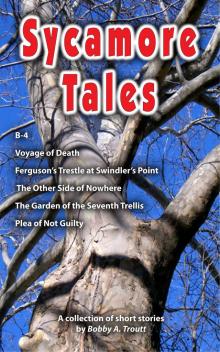 Sycamore Tales
Sycamore Tales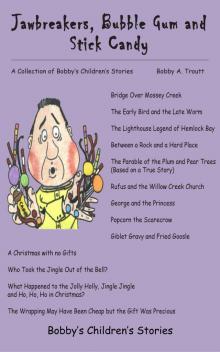 Jawbreakers, Bubble Gum and Stick Candy
Jawbreakers, Bubble Gum and Stick Candy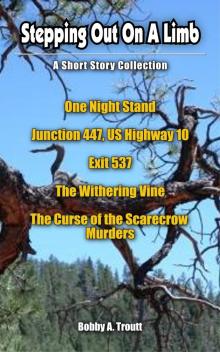 Stepping Out on a Limb
Stepping Out on a Limb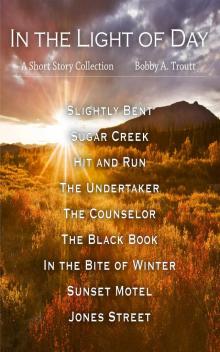 In the Light of Day
In the Light of Day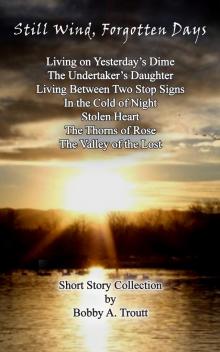 Still Wind, Forgotten Days
Still Wind, Forgotten Days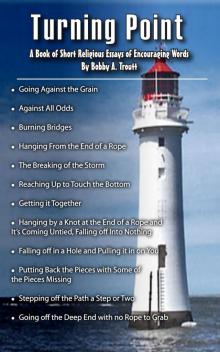 Turning Point
Turning Point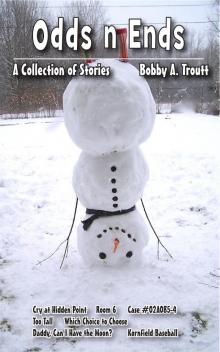 Odds n Ends
Odds n Ends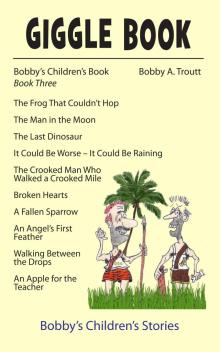 Giggle Book Three
Giggle Book Three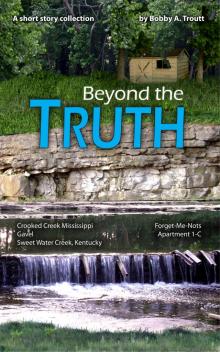 Beyond The Truth
Beyond The Truth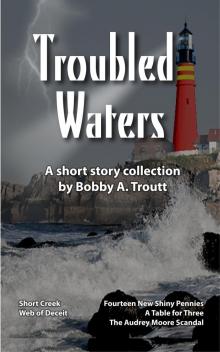 Troubled Waters
Troubled Waters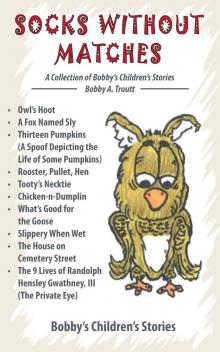 Socks Without Matches
Socks Without Matches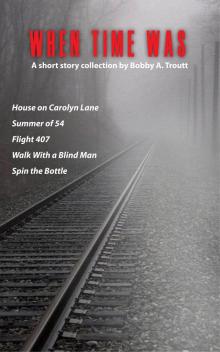 When Time Was
When Time Was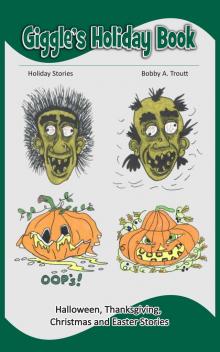 Giggle's Holiday Book
Giggle's Holiday Book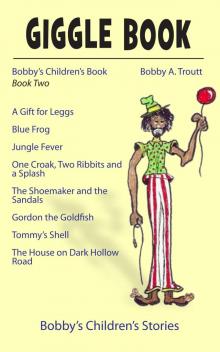 Giggle Book Two
Giggle Book Two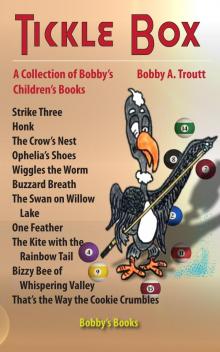 Tickle Box
Tickle Box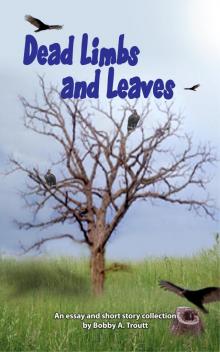 Dead Limbs and Leaves
Dead Limbs and Leaves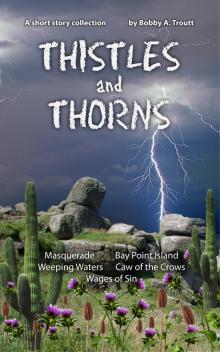 Thistles and Thorns
Thistles and Thorns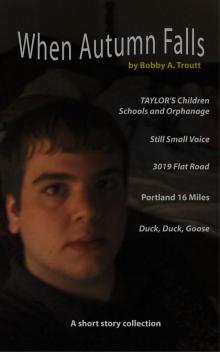 When Autumn Falls
When Autumn Falls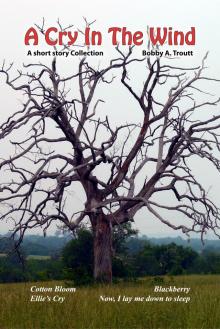 A Cry in the Wind
A Cry in the Wind Leftover from the Holidays
Leftover from the Holidays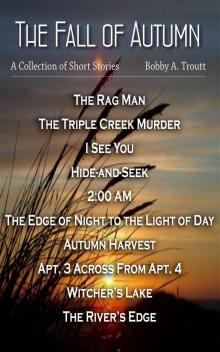 The Fall of Autumn
The Fall of Autumn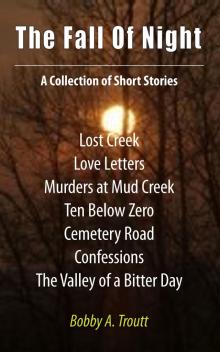 The Fall of Night
The Fall of Night Giggle Book Four
Giggle Book Four